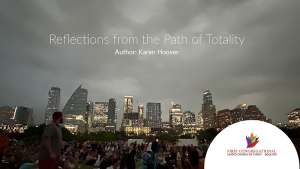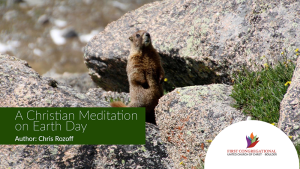Living in Liminal Space
Author: Larry Dansky
“Therefore do not worry about tomorrow, for tomorrow will worry about itself. Each day has enough trouble of its own.” Matthew 6:34
“The secret of health for both mind and body is not to mourn for the past, worry about the future, or anticipate troubles, but to live in the present moment wisely and earnestly.” The Buddha
I grew up in a family culture of “what if,” where decision-making was often dominated by worry about the future. For example, grades in school were not a measure of what I had learned, but an important part of what college I could get into. I took Latin in high school not because it would help with linguistics or to learn how to speak a new language, but because it would help me get into med school and eventually become a doctor. If cell phones were available during those times, my parents would have been anxiously waiting for someone to develop a crystal ball app to download.
It is hard to “not-know” the future. That’s why so many people spend money on psychic readings of tea leaves and Tarot cards, and waiting for that crystal ball app. Psychologists say that uncertainty is a leading cause of stress, and part of that stress comes from the lack of control and feeling of powerlessness we have when we don’t know. That stress seems to be more prevalent today with the pandemic, since we are faced with so many questions that are hard to answer. How much risk am I personally willing to take? How sick will I be if I get infected? Should I send my children to schools? Will there soon be a vaccine that’s safe and effective? We simply don’t know the answers to these questions.
So we are living in liminal space, the time between the ‘what was’ and the ‘next.’ I think of it as if we’re at the threshold between a room we are leaving, and now waiting at the door of a room that’s pitch black. We’ve all had short-term experiences of living in liminal space. We move to a new city, not knowing how it will work out. We retire from work and don’t know what’s next. But with the pandemic, we are stressed more because we have no idea about how long we’ll live this way. It could be months, or it could be years.
So what do we do? One response could be to find ways to live with not-knowing. Psychologists and self-help books are full of techniques that are helpful in developing the acceptance of not knowing. Recommendations include not dwelling on things you can’t control, seeking support from those you trust, and looking into mindfulness training. For me, the discipline of silent meditation (Zen meditation and Christian Centering Prayer) provides an opportunity to practice being mindful of the present moment. It has helped me awaken quicker to my feelings of loss of control and worry about the future. At those times, I find it helpful to recite a phrase or mantra that brings me to the present moment. “Be still and know that I am God” (Psalm 46:10) is my go-to, but I also use “live one day at a time,” and “this too shall pass.” I am then able to practice gratitude for things that are important to me today, such as my health and my family. That is a very powerful antidote for the stress of not-knowing and worrying about tomorrow.
I do not claim to have perfected this approach; it is a work in progress. I have found one positive aspect of living in this pandemic. It has provided me multiple opportunities to practice how to be comfortable with “not knowing.”
Holy one, help me to practice being in the moment. Tomorrow can worry about itself, and I have enough on my plate for today.



